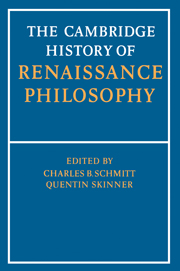Book contents
- Frontmatter
- Introduction
- PART 1 THE INTELLECTUAL CONTEXT
- 1 The conditions of enquiry: Manuscripts
- 2 The conditions of enquiry: Printing and censorship
- 3 The Renaissance concept of philosophy
- 4 Translation, terminology and style in philosophical discourse
- 5 Humanism
- PART 2 PHILOSOPHY AND ITS PARTS
- PART 3 SUPPLEMENTARY MATERIAL
- Biobibliographies
- Bibliography
- Index nominun
- Index rerum
- References
4 - Translation, terminology and style in philosophical discourse
from PART 1 - THE INTELLECTUAL CONTEXT
Published online by Cambridge University Press: 28 March 2008
- Frontmatter
- Introduction
- PART 1 THE INTELLECTUAL CONTEXT
- 1 The conditions of enquiry: Manuscripts
- 2 The conditions of enquiry: Printing and censorship
- 3 The Renaissance concept of philosophy
- 4 Translation, terminology and style in philosophical discourse
- 5 Humanism
- PART 2 PHILOSOPHY AND ITS PARTS
- PART 3 SUPPLEMENTARY MATERIAL
- Biobibliographies
- Bibliography
- Index nominun
- Index rerum
- References
Summary
THE SCOPE OF PHILOSOPHICAL TRANSLATION
Between Roberto Rossi's translation of the Posterior Analytics in 1406 and Niccolò Leonico Tomeo's rendering of the Parva naturalia in 1522–5, eighteen Italian and Byzantine scholars produced nearly fifty different Latin versions of half as many of Aristotle's works –including spurious works and counting the Parva naturalia as one work. In the sixteenth century more than fifty scholars from various parts of Europe produced nearly 200 Latin translations of over forty texts ascribed to Aristotle. The most productive of the fifteenth-century translators were the Byzantines George of Trebizond and Johannes Argyropulos, who each completed ten texts, but in the sixteenth century the Frenchman Joachim Périon challenged even the prolific William of Moerbeke by turning more than twenty works into Ciceronian Latin. These three scholars took very different approaches to philosophical translation. George of Trebizond stayed as close to the verbal structure of the text as comprehensible Latin would permit, while Argyropulos translated so loosely that he was often condemned as a paraphraser. George believed that transliteration was sometimes justified by an untranslatable word or phrase in Greek, but Périon wanted to find a Ciceronian equivalent for everything the Stagirite had said – unlike Argyropulos, who was content with some of the unclassical Latin that medieval translators had introduced. Variations in translation served varieties of audience, and the audience changed with time as it was educated by new accomplishments in translation. Before the 1520s, most works of Aristotle that were printed were medieval Latin translations; only after that time did readers of Aristotle see more humanist Latin in print or much Greek at all.
- Type
- Chapter
- Information
- The Cambridge History of Renaissance Philosophy , pp. 75 - 110Publisher: Cambridge University PressPrint publication year: 1988
References
- 4
- Cited by

